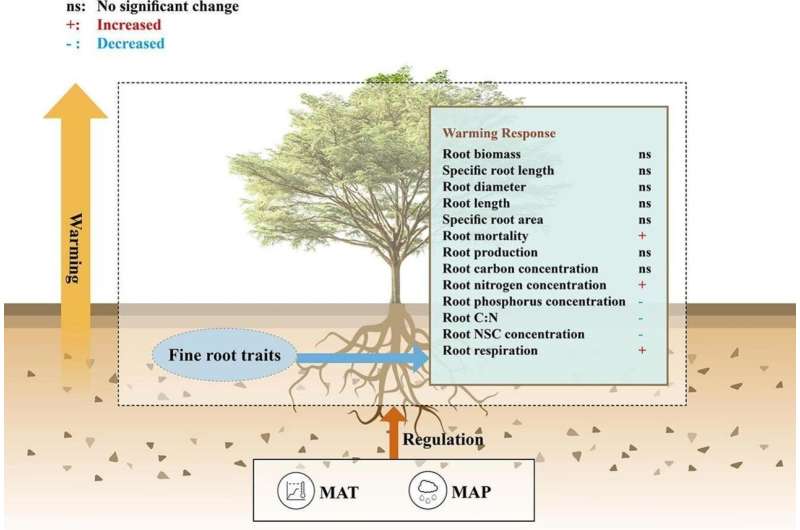This article has been reviewed according to Science X's editorial process and policies. Editors have highlighted the following attributes while ensuring the content's credibility:
fact-checked
peer-reviewed publication
trusted source
proofread
Meta-analysis elucidates how fine-root functional traits respond to experimental warming in woody plants

The fine root (diameter ≤2 mm) is the key plant organ for nutrient and water uptake, and is also important for carbon (C) and nutrient cycling. Global warming has complex effects on vegetation dynamics and nutrient cycling in terrestrial ecosystems. However, how warming alters fine-root traits in forest ecosystems remains unclear.
To determine the effects of warming on fine-root traits of woody plants, Dr. Zhao Xiaoxiang from the Wuhan Botanical Garden of the Chinese Academy of Sciences conducted a meta-analysis based on 431 paired observations of 13 fine-root traits from 78 studies around the world.
The team also evaluated how warming magnitude, warming duration, and climatic conditions would regulate the effects of warming on these fine-root traits. The resulting article, titled "The effect of experimental warming on fine root functional traits of woody plants: Data synthesis," was published in Science of the Total Environment.
According to the researchers, warming had minimal effects on fine-root biomass, root production, and morphological traits. Warming increased fine-root nitrogen (N) concentration, root respiration, and root mortality, but decreased root nonstructural carbohydrate (NSC) concentration, fine-root phosphorus concentration, and root C:N.
With increasing of warming magnitude, the effect sizes of warming on fine-root biomass and root diameter decreased. In addition, the effects of warming on specific root length, root length shifted from negative/no- change to positive, and the root C:N shifted from negative to no-change with increasing warming duration.
With increasing mean annual temperature and mean annual precipitation, the effect size of root biomass, root diameter, root length, and root C:N decreased, and the effect size of fine root N concentration increased.
These results emphasized that warming could regulate fine-root traits to adapt to the environmental changes. Moreover, the effects of warming on fine-root traits were also modulated by warming duration, warming magnitude, and also climatic conditions.
This study could improve our ability to predict fine-root responses to climate change in shrub and tree-dominated ecosystems, and lead to a better understanding of belowground forest processes under climate change.
More information: Xiaoxiang Zhao et al, The effect of experimental warming on fine root functional traits of woody plants: Data synthesis, Science of the Total Environment (2023). DOI: 10.1016/j.scitotenv.2023.165003
Journal information: Science of the Total Environment
Provided by Chinese Academy of Sciences


















